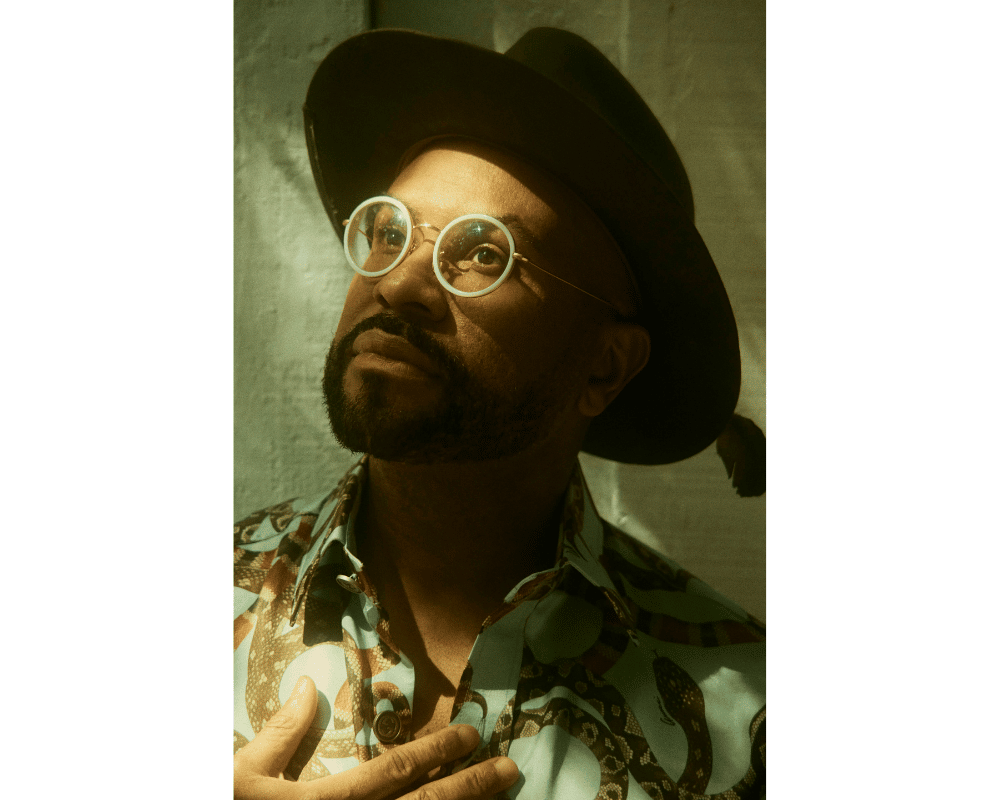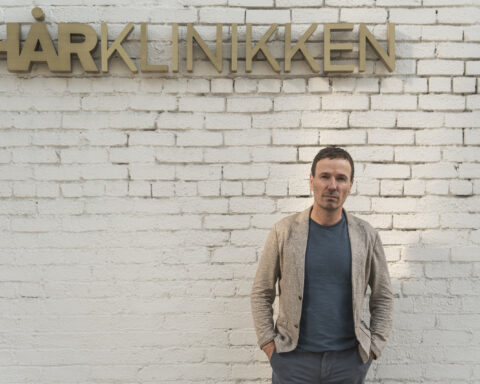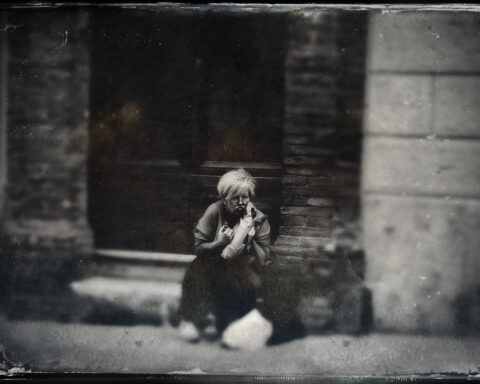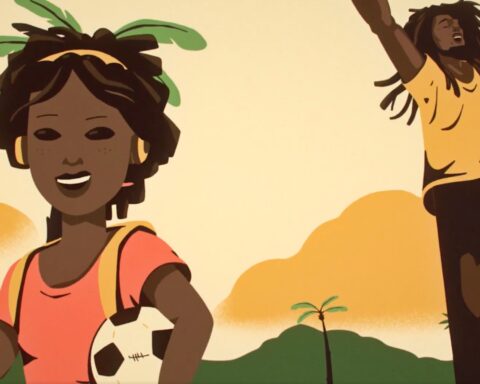Philip Lawrence has hit some of the highest notes imaginable in his entertainment career.
He’s one third of the prolific songwriting and record production team The Smeezingtons, alongside Bruno Mars and Ari Levine, earning eight Grammy Awards for his work. As well as being behind most of Bruno’s biggest hits, including global numbers ones ‘Grenade’ and ‘Just the Way You Are’, the trio have also made their mark across the pop world, from writing the unforgettable ‘F*** You!’ with CeeLo Green, to the tearjerking ‘All I Ask’ with Adele.
He’s also sung on the very biggest stages the world has to offer as part of Bruno’s vocal group The Hooligans, including two Super Bowl Halftime Show performances to around 115 million Americans each time, and for the Obamas on the White House lawn. Next up, he switches key from musical star to TV host, presenting the primetime CBS competition show ‘Come Dance With Me’, which premieres on April 15. The warm-hearted family show partners up professional child dancers with their flat-footed mom or dad to compete to win $100,000.
Alongside these creative achievements, he’s a pioneering entrepreneur too. In 2016, he bought The Record Plant in Los Angeles, California, one of the most iconic recording studios in the US. And he’s currently building CMNTY Culture, an ambitious venture bringing music and filmed content creation together under one roof in a $500 million, 500,000-square-foot development in Hollywood that will change the city’s skyline, and collaborative process, for a new generation of artists.
But during our beautifully honest conversation with Philip at his home in LA’s Tarzana neighborhood, it was his sobriety that he spoke about with the most pride. The one commemorative disc on his wall, celebrating his team’s work on Bruno’s multi-platinum album 24k Magic, was far outnumbered by momentos to mark his new sober lifestyle, having been living a more clean and honest life for the past four years.
Here, the dad-of-five talks about his achievements, professional and personal, in his roles as a creator, performer, and father.

Philip Lawrence // 📸 : Austin Hargrave
Why and how did you take the path to becoming a songwriter?
I think my songwriting journey began before I was aware of it. I was always a bit of a performer, my first time on stage I was five years old, in a little velvet suit, so I caught the bug early. And I’ve always found joy in expressing myself, although in high school some of my teachers interpreted that as me being a good BS-er! But then as I got older and discovered songwriting, I realized I could use these powers for good.
Tell us about your parents, how did they influence you?
I’ve got f**ing great parents, man. I got lucky. My dad is a master of ceremonies, a businessman, a comedian, and real jack of all trades. And my mom and my grandmother were both opera singers, and my mom was the choir director in our church in Indiana, so we grew up singing all kinds of music.
There was a sense of dignity in my household. My mom was really big on speaking the right way, and making sure you understand the power of your words. Say what you mean, and mean what you say. So that stuck with me.
As a Black kid growing up in Indiana, it’s important that you’re careful about how you move, and what you say, and how you present yourself, both from a safety standpoint and also from a ‘have them respect you’ place. My mom and dad instilled a set of values in me that have stuck with me my whole life.
So you were a good kid, and stayed out of trouble?
I was, but when I got into high school and discovered alcohol it started to change a little bit. I think I always had this sort of natural discomfort in my own skin. I can’t put my finger on it. It was the other thing I could use to alter my state, other than music. And music for me was always synonymous with acceptance. I would be on stage, and there’s the applause. So at a young age, I went out into the world expecting the world to applaud for me. And that manifested itself, I think, in having a false sense of validation, and what was real and authentic. I thought if people accept me, and they applaud for me, then I’m okay.

Philip Lawrence // 📸 : Austin Hargrave
When did the songwriting begin to take center stage?
The songwriting piece began when I was working at Disney World, Florida, in my late teens, early 20s. I was performing in shows at the theme park, then in my downtime I taught myself to play the piano in the warm-up room, and started to write down the songs that were in my head. I really fell in love with that personal experience of expression, but I didn’t know at the time it was going to be a career for me, because I always thought I was going to be on stage, and do what Bruno Mars did. That was my dream. But songwriting turned out to be the greatest discovery of my life.
I moved to California not knowing anyone, but still wanting to be in front of the camera and perform. Then I met Bruno through a mutual friend, he had just moved from Hawaii, I had come in from Florida, and we were both trying to find our way in the city. We just hit it off. We both had this dream of being on stage and being stars, and we discovered that it’s hard work. Everybody has that same dream, so how do you differentiate yourself from everyone else? So we got humbled, and decided to start by really sharpening this songwriting tool.
What did it take to master that skill, and what was your process when you wrote together?
A big part of our success came from us being real friends, and that comes through in our songs. We discovered early on that we wrote these love songs, then would go on stage to perform them, and the music wasn’t really reflecting our personalities. So we started to have a bit more fun in the studio, and writing more uptempo songs.
Like any great skill, you need to do your reps. You need experience, and to put in the time. Songwriting is no different. When you listen to a three-minute song, as a listener, it feels easy. Listen to The Beatles, it sounds so simple, but then you try to do it yourself and you realize those guys were brilliant.
There’s this spontaneous inspiration in the studio, but you need to be in a personal space that is free enough to let it come through. You need to be open enough. When we finished the first album [Doo-Wops & Hooligans] , we went into this period of feeling the pressure to outdo it. So you’re in the studio stressing out, and the energy is off. So we realized we had to stop getting in the way of the love and joy. It’s right there, it’s waiting for you, and it wants you to experience it in a pure way. So when you remove the stress and anxiety of what the outcome might be, and stay open to the process, that’s where the brilliance finds you.

Philip Lawrence // 📸 : Austin Hargrave
We’re surrounded by sobriety-inspired artwork and books here in your house, it’s clearly something that’s important to you and that you’re proud of, as you should be. How has that journey been for you?
It’s the best decision that I’ve ever made. I always believed it was unattainable. I thought that I was who I was: You’re going to be the life of the party, you’re going to drink too much, you’re going to have a hangover, you may have to apologize for a couple of things you did or said, and life goes on. But for me, the alcohol and the drugs and the lifestyle just took a toll on me. And it sucked the joy out of living for me. I’m on the road, performing in places that I’ve never even knew existed, and they don’t speak our language, but they’re singing our songs. But I’m in this place of restricted gratitude, because I’m so profoundly grateful that I’m living my dream, but I can’t enjoy it because I’m encumbered by this disease, this addiction, and this need to fill some sort of void that I was born with. And finally, that reached a fever pitch, and it led me to rehab. It was there that I discovered there’s another way to live. I’m in a room full of guys, and they’re all being honest and vulnerable and sharing about very intimate things. I’ve never really experienced that before, and I was hooked.
For so long, I lived a portion of my life in the dark, and hid behind lies, and was definitely afraid of the truth, the truth of that kind of lifestyle. What sobriety has shown me is the other side of confronting those lies, and finding that truth, and how much brighter life is supposed to be.
It can be hard for people in your walk of life, where the partying and the work can be intertwined. It’s not like you’re not getting up for your office job in the morning, and therefore realize it’s time to quit. And some people even believe that they need these substances to work, and fuel their creativity. How have you found songwriting and performing since being sober?
It was scary at first. I couldn’t take a couple of shots before I start, which used to just be part of the process. And there’s this culture around the entertainment industry where drinks and other stuff are just accepted. But as an addict, I had to come to terms with that, and not hide behind the fact everyone was at it. Not everyone is an addict, there are a lot of people who can party and be okay. Once I got honest about what was really going on with me, then I could get some help. But I was certainly afraid that I would lose my creativity, that I wouldn’t be cool, that I wouldn’t have any more ideas. Who am I without this thing? But I’ve found that I’ve been more creative than I have ever been in my life. I have more clarity, more stamina, less anxiety. And when you feel better about yourself, your art is better. I had to ask myself what kind of life do I want, and especially having kids, what kind of father do I want to be. Kids notice if you’re present or not, and sobriety has just really taught me to enjoy the little moments, and appreciate what is important in life.
That’s wonderful, and perfect that your new project is a true family show. I’m always looking for things to watch with my kids that isn’t the same mind-numbing cartoon for the hundredth time, and this looks perfect family viewing. How did this gig come about, and is this the first time you’ve been a host?
Yeah, it’s my first time hosting since working at Disney World as a teenager, a very long time ago! I’ve got to shout out Sharon Vuong, who used to work at CBS. I went in there for a meeting to pitch another show. They didn’t really like it, but they did like me, so they said they were going to find me something to work on with them, and they came through and really did. We filmed the pilot in January 2020, just before the pandemic, then filmed the rest of the show last June and July. The kids are professional dancers, and they’re dancing with their parent who has three left feet. It’s really cool to watch the journey of these parents who can’t dance. It’s a perfect balance of heart, laughter, and fun.

Philip Lawrence // 📸 : Austin Hargrave











Proud of you. Keep living your dream filled with honesty and clarity!!!
Proud of you. Keep living your dream filled with honesty and clarity!!!
I
I